As apps for mental health are becoming more popular and the market is far from being saturated, building a mental health app may well become your next successful venture. To give you an understanding of what the market looks like and its many nuances, we hand-picked the best mental health apps available right now and pinpointed what made them succeed.
We did not include Headspace and Calm, as these are highly popular and well-advertised applications, instead opting to focus on unique mental health apps recognized across different categories.
Let’s start.
MoodPath
Category: Medical
Moodpath is a mental health app designed specifically for people who have developed challenges with depression, anxiety, and eating disorders.
The app was developed with psychotherapists and scientists and is a risk class I medical device according to the Medical Device Directive (MDD).
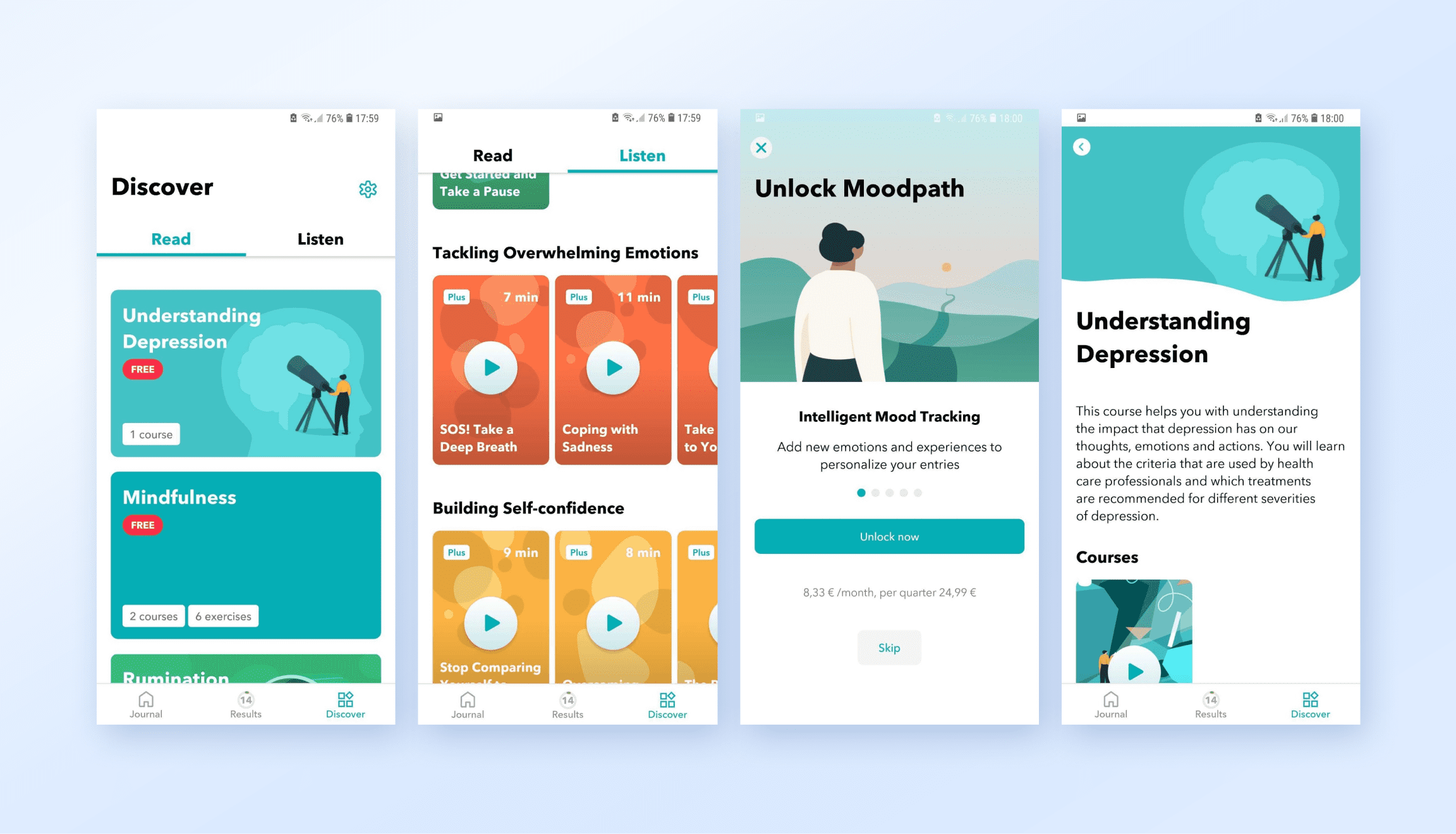
Here are some of the key features:
- Daily questions about your emotional and physical well-being
- Bi-weekly mental health assessments
- Therapists, psychologists, and other healthcare professionals with whom you can share your assessments
How it works:
- A dynamic monitoring recognizes symptoms of mental disorders
- Receive personalized recommendations based on your answers
- Helpful insights and statistics help you to detect patterns and triggers
- Optionally, you can connect Apple Health data to receive insights about the connection between mood and your physical activity
- Psychological courses and mindfulness exercises can help you with mild and moderate symptoms
Calm
Category: Health & Fitness
Calm is a mental health app for people who combat stress, anxiety, sleep problems and meditation challenges. With their Sleep Stories, breathing programs, masterclasses from celebrities, and relaxing music on the background — Calm is proved to be a #1 meditation and stress relief app.
It is also recommended by top psychologists, therapists, and mental health experts for beginners as well as for intermediate and pro users.
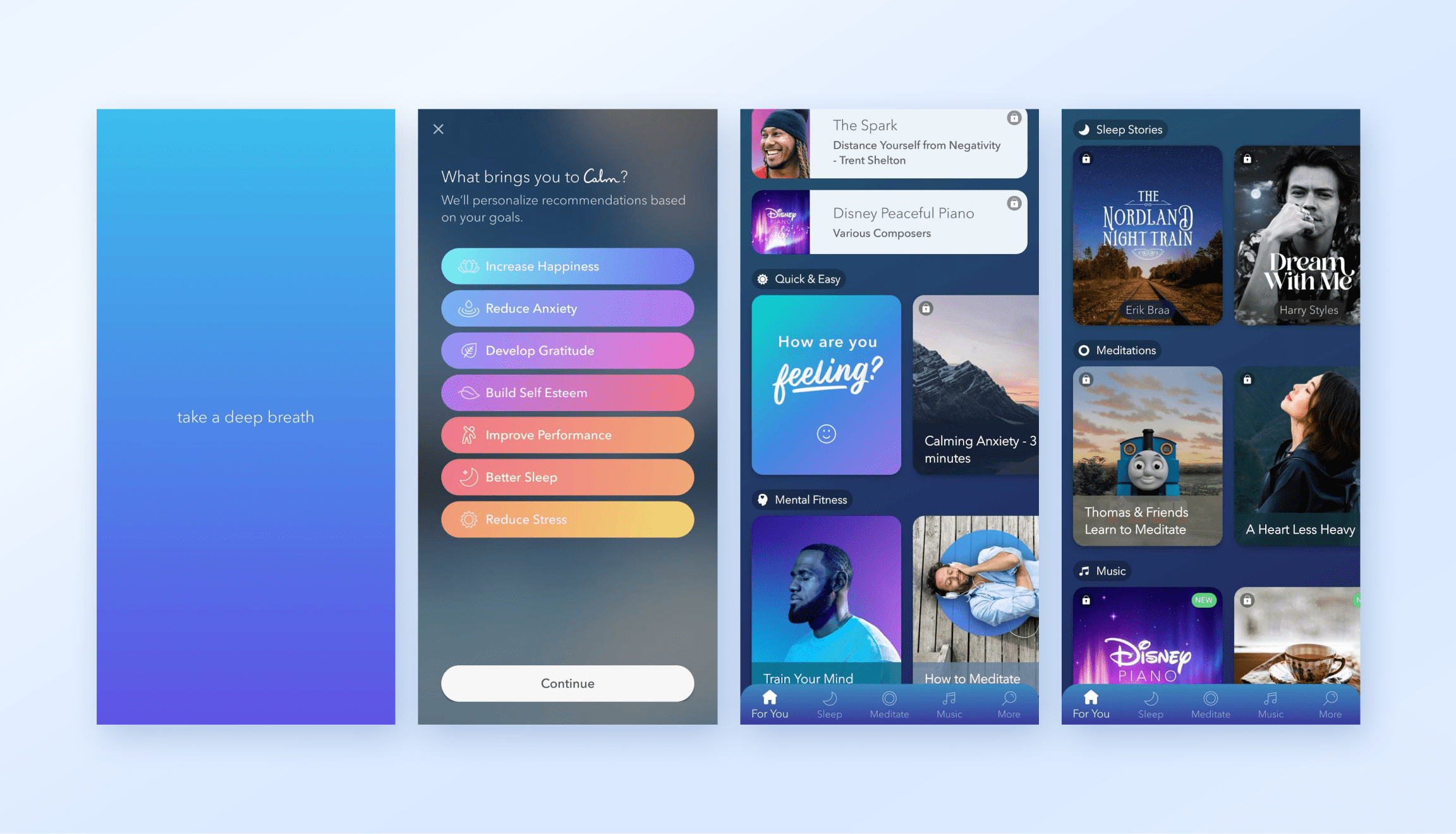
Meditation topics include:
- Calming Anxiety
- Managing Stress
- Deep Sleep
- Focus and Concentration
- Relationships
- Breaking Habits
- Happiness
- Gratitude
- Self-Esteem
- Body Scan
- Loving-Kindness
- Forgiveness
- Non-judgement
- Commuting to work or school
- Mindfulness at College
- Mindfulness at Work
- Walking meditation
- Calm Kids
Some content is only available through an optional paid subscription. If you choose to subscribe, payment will be charged to your Google Account at confirmation of purchase.
Xmed Health
Category: Social Media-Like Apps For Mental Health
Although social media platforms have grown to be stress-inducing for many users, people’s love for socializing online can be channeled to alleviate modern stressors and solve other mental health issues. The Xmed app may be the best example of that, offering users a health and lifestyle mobile ecosystem, a social network, and artificial intelligence (AI) algorithms in one package.
Here is how it works: AI asks a series of questions to identify a user’s health issue, juxtaposes that data with available medical data and information provided by other app users, and arrives at a conclusion. The user can then start talking with certified mental health professionals to tackle the problem, as well as discuss it with people who have the same issue in the app’s in-built social media network.
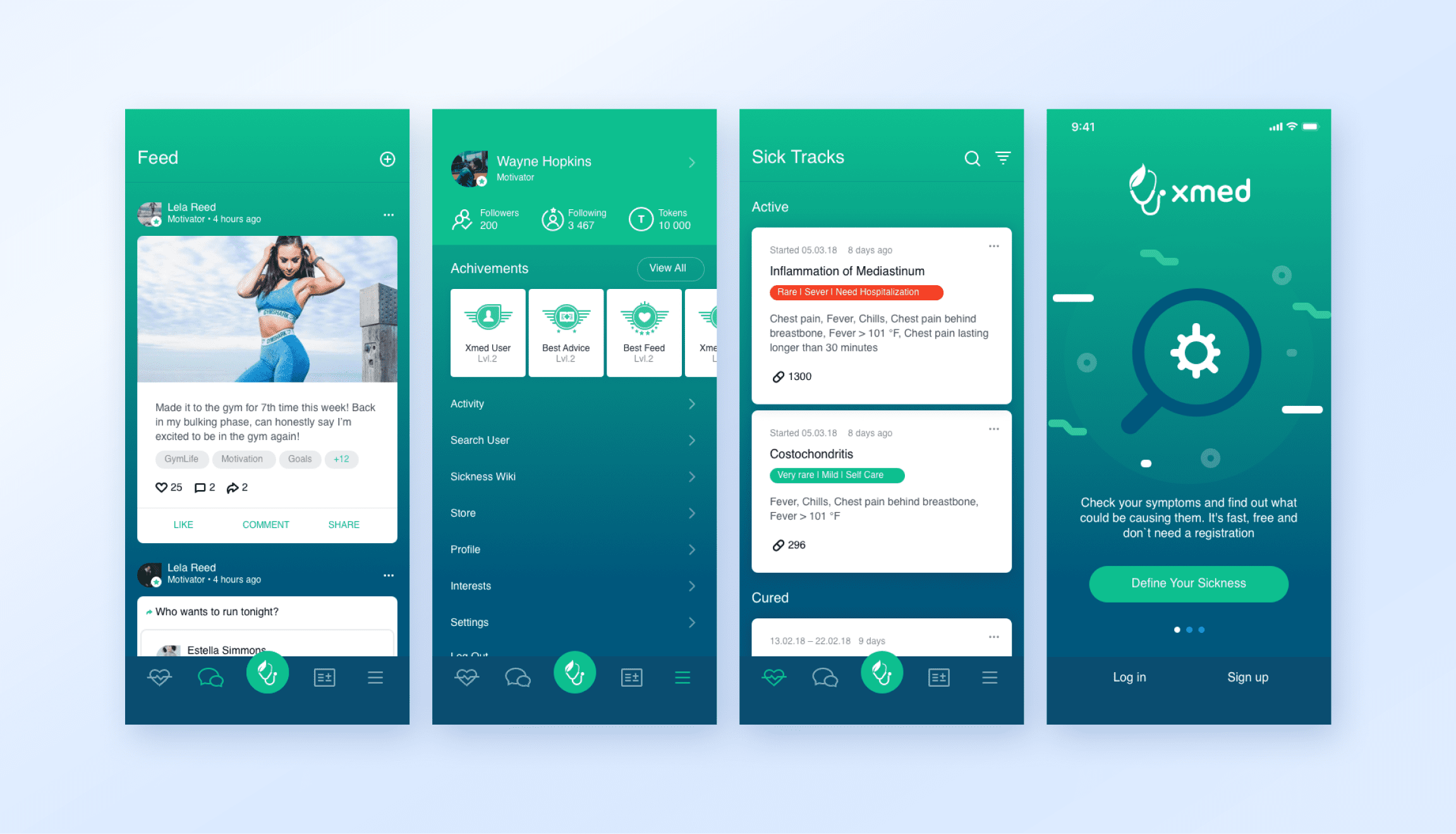
Apart from its uniqueness and technological capabilities, the Xmed Health also has a well thought out flow, whose primary focus is to help a user solve their issue, beautiful design and animations, and gamification with levelling up and achievements.
On top of all this, you can use the app to identify other health issues. making Xmed Health not only one of the best mental health apps, but also a solid health app in general.
Xmed Health is available in the Appstore.
My Possible Self
Categories: Mental Health Therapy Apps, Mental Health Tracking Apps
My Possible Self promises to help its users lower stress and anxiety levels in eight weeks with a range of features backed up by clinically approved content. To deliver on the promise, the app offers over a wide range of learning modules aimed at various stress-inducing situations in life.
The modules include:
- Stress and overload management
- Fear and anxiety management
- Overcoming loss and big life changes
- Problem solving
- Happiness and well-being management
- Tackling negative thinking
- Returning to pleasant activities
- Improving daily communication
The list does not end there, as the app’s creators continuously update it with different new modules. The first learning module is free, but to access the rest users need to have a subscription.
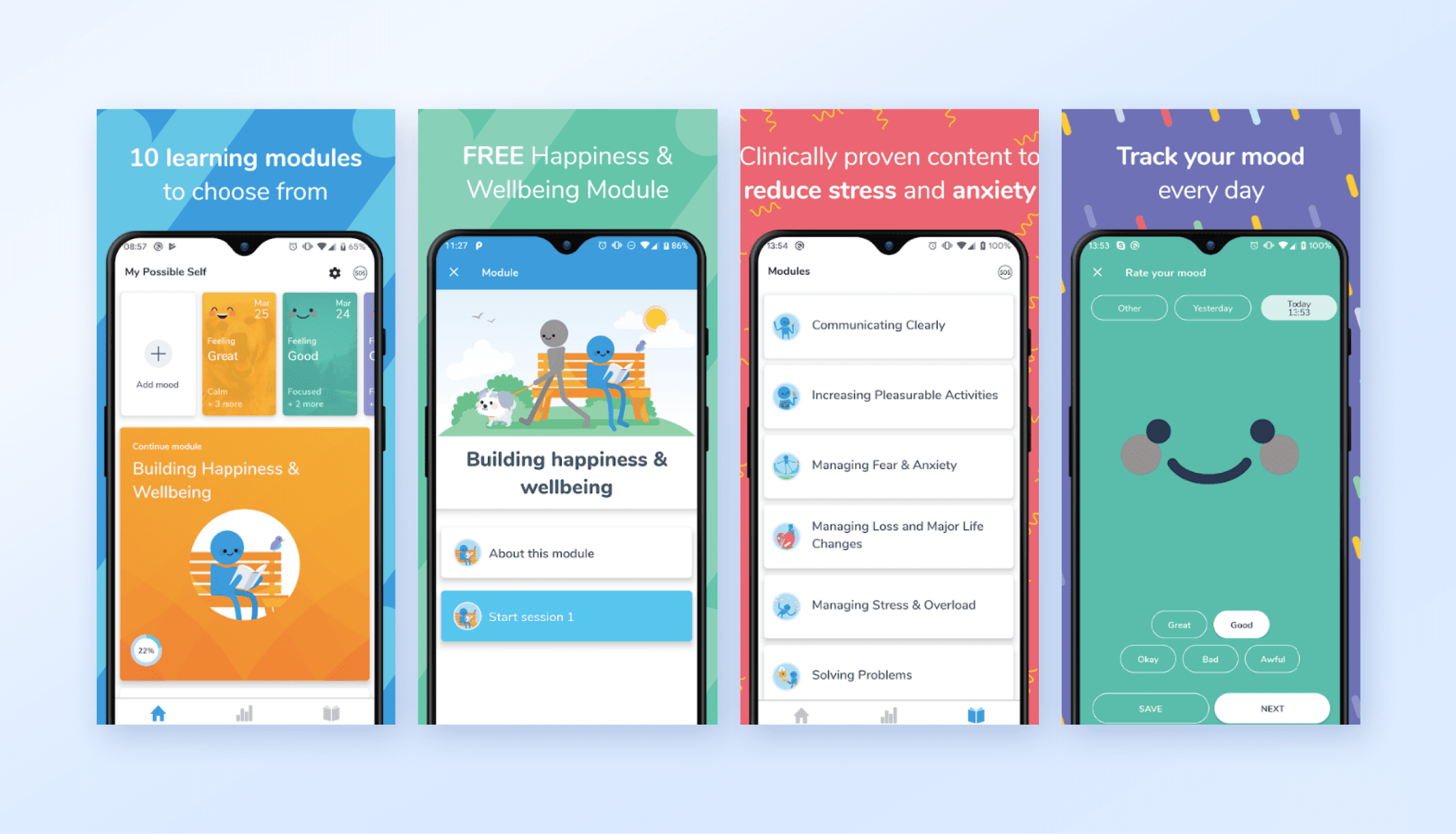
Still, the app has a number of other aspects that make it one of the best mental health apps. There is a comprehensive mood tracking tool/dairy, created with the help of the company’s in-house psychologists. A user can track their mood daily, selecting how they feel and pinpointing activities, people, and places that influence their mood and well-being.
Working alongside the tracking tool is the Mood History and Insights features that help users detect mood patterns and act accordingly to improve how they feel. The latter displays mood shifts in a comprehensive chart, showing the patterns and proposing potentially suitable lifestyle changes with the help of custom algorithms. What is more, users can add written notes and images to every mood entry — a small but nice touch that enriches the experience.
The content used in My Possible Self is clinically and statistically proven to lower stress and improve well-being in an eight weeks’ time. To ensure that, the creators partnered with a leading non-profit mental health research facility called The Black Dog Institute.
My Possible Self was warmly received by users and praised by media outlets like London Evening Standard and Buzzfeed. It is available both in the Appstore and Google Play.
Happify
Categories: Event Based Mental Health Apps, Gamified Mental Health Apps
Happify has a lot to offer. The app uses a set of comprehensive features that rely on science-based games and activities to help users fight stress consistently across all life areas.
At the app’s centre are Tracks, a section with stretches of different simple activities that help users improve their well-being on a daily basis.
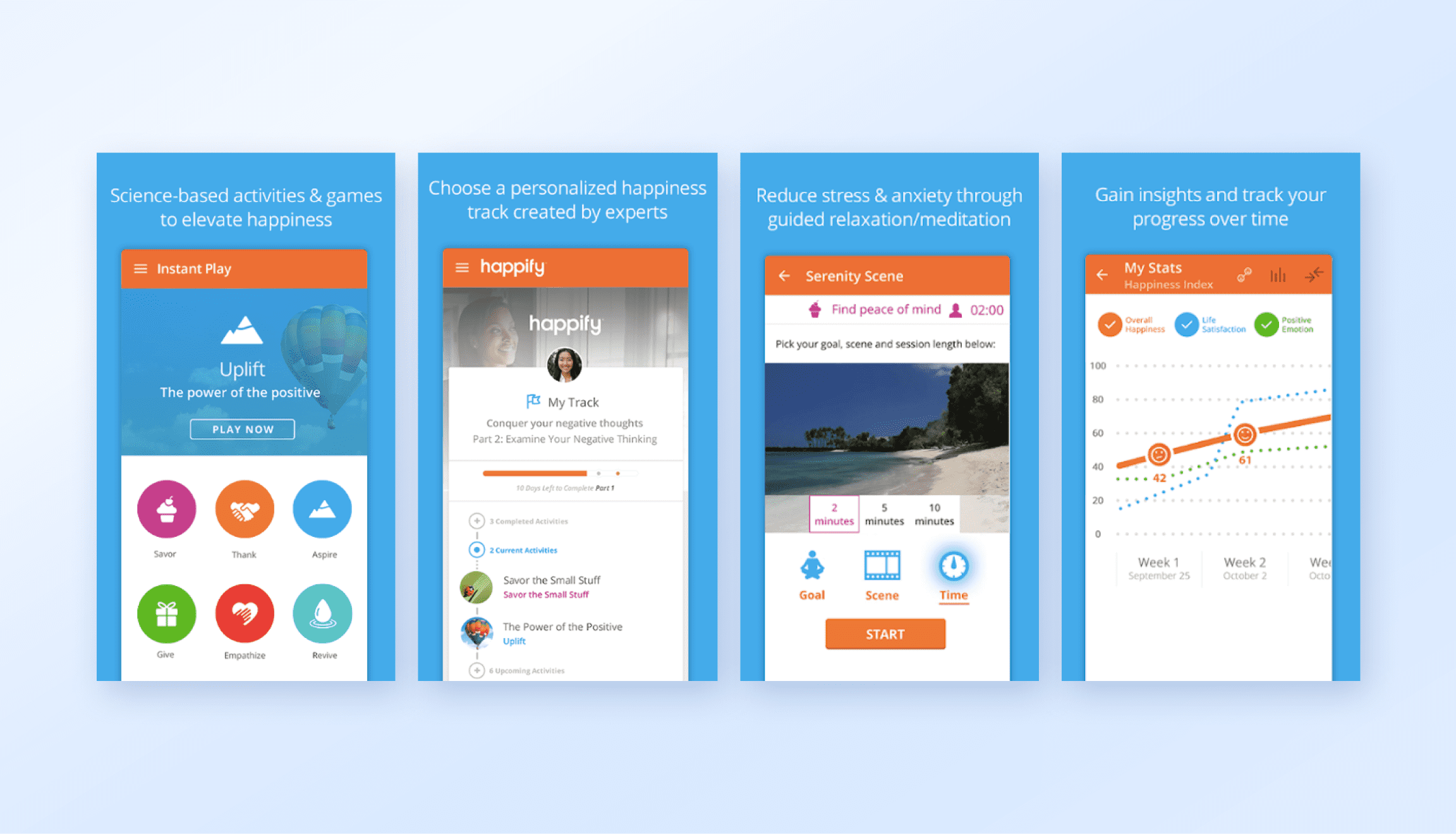
These include, for example, singling out small moments in your day that made you feel good and choosing a person to be thankful to. Every user has a progression scale for each track as well as six skills they upgrade by completing it: Savor, Thank, Aspire, Give, Empathize, and Revive. There over sixty available tracks for different aspects of life, part of them only through subscription.
For those who want small bits instead of a long progression, there is an Instant Play section. Here, users can complete activities separately for each of the aforementioned skills.
Other features include:
- Happify Daily — articles, videos, infographics, and other types of content related to improving emotional well-being
- Community — a minimalist social network users can choose to be part of and share the activities completed for the skills with others
- Negative Knockout — a game where you bring down your negative emotions in the style of Angry Birds.
The feature list is bigger still. For example, the app offers a twenty-page character strength report for each user, compiled in partnership with The VIA Institute. Meanwhile, Happify’s approaches were developed by leading scientists and experts in positive psychology, cognitive behavioural therapy, and mindfulness.
Happify was widely praised by users and media, including reviews in ABC World News and The New York Times. The company also claims that eight-six percent of their regular users report improved well-being in the two month since they started using the app.
Happify is available for iOS and Android. Part of the features are free, while the rest can be accessed by subscribing.
What Makes Top Mental Health Succeed
There is a pattern to why the aforementioned mental health apps enjoy success — they all tick the same important boxes. Here are the success factors:
- Mental health professionals should be involved in as many stages as possible
- The app should have a diverse set of features for a user to choose from
- The features should be backed up by scientific research
- The app should have its unique feature, or approach a common feature from a different angle
- Mood journal is an important feature
- Gamification helps to keep the users engaged
- The app should have an appealing design
Now that you have taken a closer look at the top apps for mental health and what makes them so, you can start planning your own unique mobile product for those who want to tackle their mental health issues in a handy, clear, and pleasant way.
Good luck!
If you want to learn more about digital healthcare technologies, see some of our recent articles on the topic:
If you need a consultation about your mental health app or other healthcare project, get in touch with our experts.